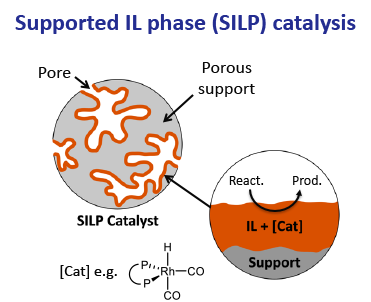When: 3 September 2024, 10:30-17:00
Where: Rutherford Appleton Laboratory, Harwell Campus, Didcot, OX11 0QX

Join us for this free one-day symposium organised by the Institute of Chemical Sciences at Heriot Watt University, the Department of Chemistry at the University of York and the UK Catalysis Hub, supported by UKRI, to look at developments in the understanding of Supported Ionic Liquid Phases (SILPs) and their application in catalysis.
With Plenary Lectures by Professor Walter Leitner (Aachen) and Professor Marco Haumann (Erlangen), the meeting will feature talks from Early Career Researchers as well contributions dealing with facilities development and the wider catalytic perspective. There is an events Information link to learn more about the subject matter.
Ionic liquids (ILs) are molten salts with low melting temperatures, typically composed of complex ions. Archetypal examples are the 1-methyl-3-alkylimidazolium salts shown below. They have been of considerable interest in recent years due to their unique combination of physical properties, including low vapour pressures, inherent conductivity, often high chemical and thermal stability, and their ability to dissolve a range of solutes of differing polarity. They have been investigated for their potential use in a wide range of areas including catalysis, biomass processing, carbon capture and storage (CCS), and various energy technologies.
Supported ionic liquid phases (SILPs) represent a proven strategy for catalysis. SILPs comprise a thin ionic liquid (IL) film deposited on a high-surface-area support (eg porous silica), in which a homogeneous catalyst can be dissolved producing an effectively heterogenised arrangement. The high surface area of the support and the heterogenised nature of the catalyst coupled with the selectivity of its homogeneous mode of action makes SILPs highly effective materials with demonstrated effectiveness and even greater potential yet to be realised.
Speakers:
Professor Marco Haumann (Erlangen) – Advanced SILP Concepts for Continuous Homogeneous Catalysis
Professor Walter Leitner (Aachen) – Multifunctional Catalysts based on Metal Nanoparticles at SILP-Type Supports: From Flexible to Adaptive
Sharmin Antara (Erlangen) – Gas-phase Hydrogenation with Dissolved Pt and Rh Complexes in Ionic Liquids – Adjusting the Location of Reaction by Ligand Design
Dr Naomi Elstone (York) – The Properties and Structure of Ionic Liquid Mixtures as Applied to SILP Catalysis
Dr Paul Lane (Heriot Watt) – New methods for Characterising Ionic Liquids for Applications in SILP Catalysis
Dr Max Skoda (RAL) – Applications of In situ Neutron Reflectivity at the air-liquid interface
For more information, please click the event page: RSC events Page
Please submit a poster abstract via this link:
There are a limited number of student bursaries available for student poster presenters – please apply via the link above or here
Register for free at https://uk-catalysis-hubuk-catalysis-hub.idloom.events/SILP-catalysis?preview=65d866968f047
Download meeting flyer here.




